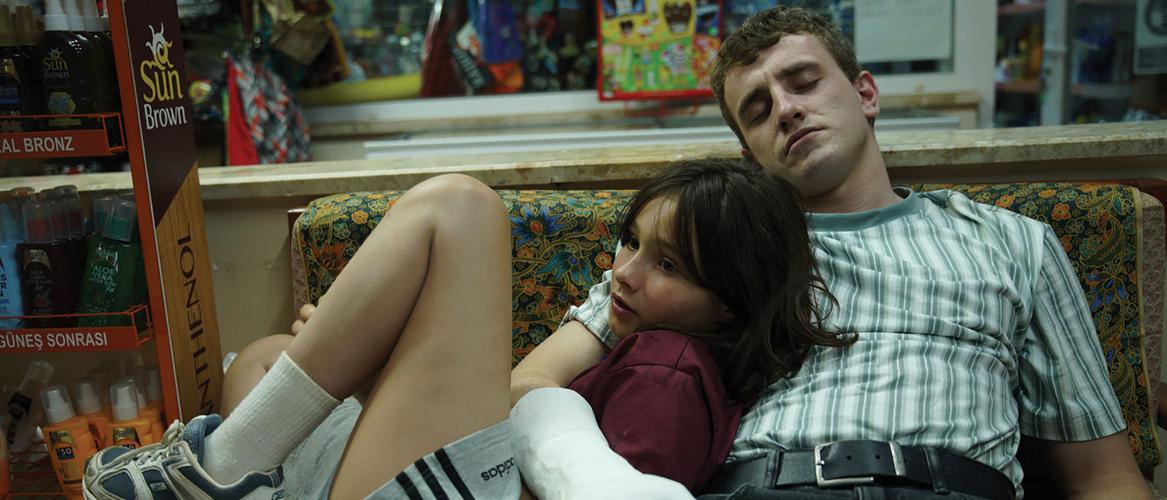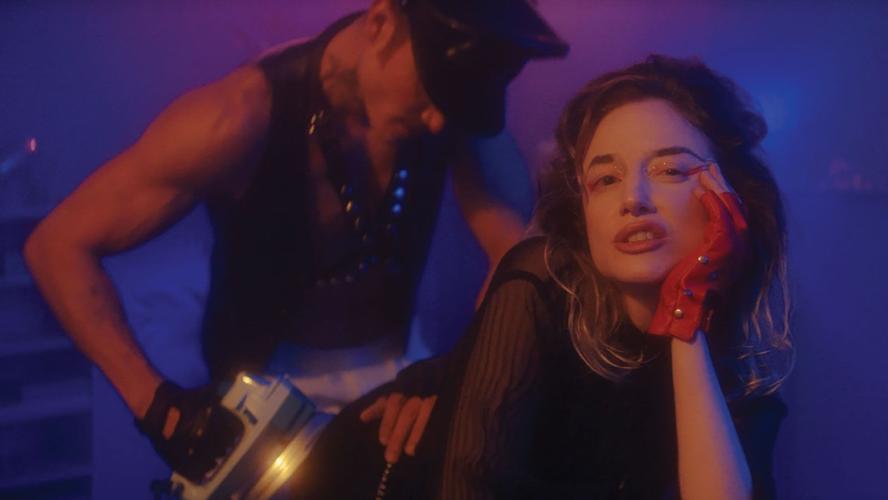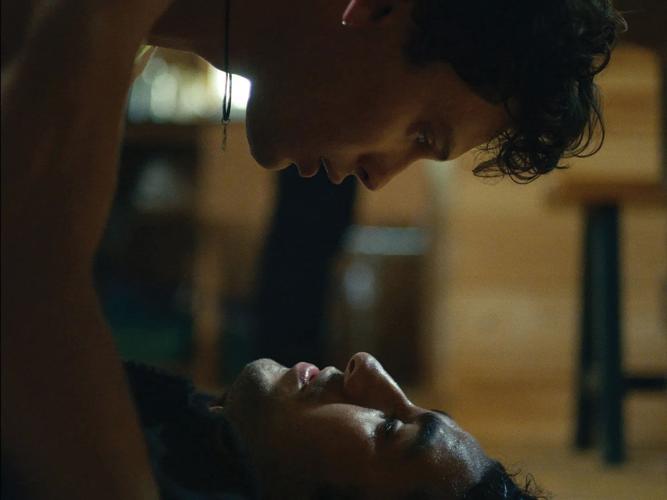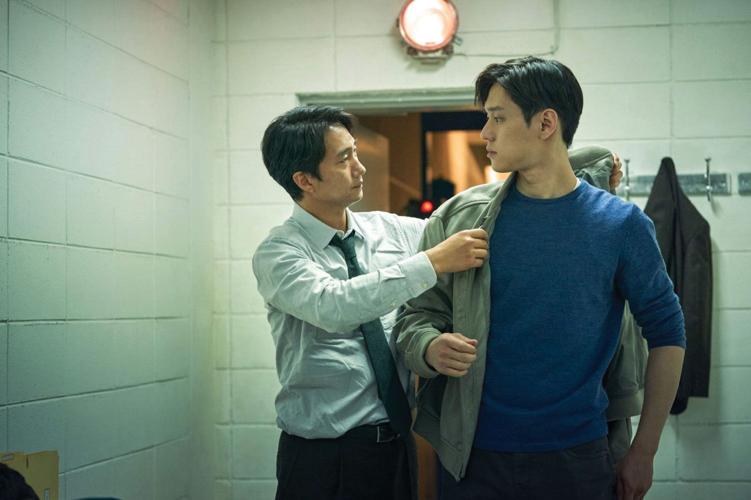Through a grand confluence of elements in fall 2022, there was an alignment in film festivals. This happened periodically here in Nashville, with audiences in the past stretched to the breaking point by too many options spread too far out, but thankfully that seems to have eased this year. As New York City is the cinephile center of the U.S., they’re set up to better handle lots of options. In fact, I was able to turn my usual (2002-2019) journey to cover the New York Film Festival into an expansive tear through the NYFF, NewFest and the Brooklyn Horror Film Festival. (For more focused coverage on the BHFF, check last week’s installment of my Scene streaming column.) The defining spirit of any film festival, I find, is the thematic through-lines and internal dialogues that their respective slates seem to be having, and expanding one’s perspective outward yields an even richer playing field. This feels even more the case when noticing the points where different festivals feature the same film, but in differing contexts.
And if any film spanned contexts and festivals with grace and fire, it was All the Beauty and Bloodshed (Centerpiece of the NYFF, Closing Night for NewFest, coming soon to the Belcourt) from Oscar-winning documentarian Laura Poitras, who can’t help but speak difficult truth in all sorts of situations. The film is an exceptional document of the life and work of photographer Nan Goldin as well as an examination of her activism against grotesque pharmaceutical profiteers the Sackler family. Goldin’s group, PAIN, works for harm reduction, destigmatization of addicts, and holding responsible the corporate greed that caused the opioid crisis eating America alive from within. But it’s the way Poitras lets the various aspects of Goldin’s life and art speak to one another that elevates the film from great documentary to humanist triumph, letting the appearance and voices of brilliant artists that we lost in one plague (namely Cookie Mueller and David Wojnarowicz) gain resonance as we confront the subsequent plagues of Oxycontin and COVID-19. There are few unspoken moments that hit with the acknowledged force of lifelong smoker Goldin when she switches to a vape.
In addition to the Poitras film, documentaries were readily knocking it out of the park. The Indian film All That Breathes (NYFF, coming soon to the Belcourt), about a group of men rescuing injured birds and nursing them back to health so they could rid India of organic trash and waste matter, is magical and deeply upsetting, and Descendant (NYFF, streaming on Netflix) details the search for the remains of the last slave ship to deliver people to the Alabama’s Gulf Coast. The latter is essential viewing for anyone who studies the way America metabolizes its history, as well as anyone who has a skeptical approach to how government steps in and administers the commemoration of these horrors; it’s a cinemascope examination of how the stories of the descendants of the slave ship Clotilde are seen as an abstraction to be made into something concrete for the white world, equal parts Beloved and Chinatown. Both are as complicated and enthralling as a good mystery, but they are rooted in something much more imminent and visceral.
Though not a documentary, Paul Schrader’s Master Gardener (NYFF, being distributed in the U.S. by Magnolia Pictures) pairs nicely with Descendant in the way it focuses on how the legacy of racism, the Confederacy and America’s flamingo-like approach to confronting the past is literally carved and colored into the land around us. Plus it also has an amazing Sigourney Weaver performance as every complicated rich old white woman you’ve ever met. And the Spanish film Alcarràs, which won the Golden Bear at Berlin this year, takes on the generational relationships between land, landowner, and worker in a way that never goes for an easy choice or a moment that rings false. It’s something special, equally charming and wrenching. Also, it understands that gabber is the European equivalent of speed metal in an American film when it comes to easy signifiers.

Aftersun
As far as that kind of sustained emotional impact and evolution, it was a remarkable year. Charlotte Wells’ Aftersun (NYFF, also the recent Nashville Film Festival and playing at the Belcourt sometime soon) is a deeply moving exploration of how to reassemble the fragments of memory into an approximation of a person no longer with us, but in a manner that’s kicky and vibrant and textured. At times feeling like a junior high riff on Morvern Callar, it’s a subtle and beautiful film that uses “Under Pressure” in a way that simply owns it forever. It’s got the cumulative emotional force of 10,000 Maniacs’ “Verdi Cries,” but for the generation who fixed upon Gina G’s “Ti Amo.” If Paul Mescal as that film’s amiably mysterious father was the best performance by a male actor at the NYFF, then it was equaled in every possible way by Park Ji-min in Return to Seoul (NYFF, Sony Classics will put this out at some point, likely at Regal Green Hills or the Belcourt). Park made her acting debut as a French woman adopted from South Korea as an infant, now trying to reconstruct her life before France, reconnecting with her birth parents. It sounds very traditional and safe, but as this film rolls along it gathers force, and by the end of it, behold, it has kicked your heart’s ass. Keep an eye on Park Ji-min; this is an incredibly auspicious debut, one that I think exceeds La Blanchett in TÁR (which you can read a full review of here).

Cate Blanchett in TÁR
And honestly, anyone eager to see some of the finest performances of the year needs to see Alice Diop’s Saint Omer (NYFF, U.S. distribution by Super/Neon), a remarkable dissection of the impulses behind true-crime fandom as well as the burdens society holds women particularly responsible for. Kayije Kagame (as a journalist investigating a murder trial) and Guslagie Malanga (as the accused) are staggeringly good in a film that takes the genres of courtroom drama and Medea derivative and crafts something altogether different that will knock you flat.
It’s awesome that the erotic thriller is making a comeback, leading with Park Chan-wook’s Decision to Leave (now playing at the Belcourt), a police procedural with impeccable heat and a stellar labyrinth of crime and passion, with a staggeringly good performance from Tang Wei as the femme fatale Seo-rae. Just as flush with twists and turns and political intrigue, but with even more sweaty excesses and nudity that’s necessary to the plot is Stars at Noon (available via video on demand; streaming soon on Hulu because some things are too weird for even A24). It’s Claire Denis’ most narratively ordered film (an adaptation of a 1986 Dennis Johnson novel) and features a dynamite Margaret Qualley in what would have been the Roy Scheider role had the film been made in the ’80s.

Decision to Leave
If you were to do a 23andMe for that genre, you would find a through-line stretching back to 1972’s The Mother and the Whore (NYFF, coming from Janus in some capacity), Jean Eustache’s immortal three-and-a-half-hour epic of sexual freedom and emotional bondage, now featured in a gorgeous new 4K restoration that, more importantly, features a subtitle translation that makes the film feel much more alive (and also finds the mordant humor within as well for English-speaking audiences). The other big event in the Revival/Restoration section of the NYFF was a screening of Andrei Tarkovsky’s Solaris with a new live score, which was an enthralling and transporting experience, pulsating with the organic and the electronic in harmonious balance.
It should go without saying that the return of the musical extravaganza is a good thing for the visual arts. Mohammed Shawky Hassan’s Shall I Compare You to a Summer’s Day (NF, no U.S. distributor as of yet) is an Egyptian tableau of desire and emotional evolution — incredibly striking in its depiction of queer intimacy and also captivating to audiences who aren’t normally able to access contemporary Egyptian stories, much less queer ones. João Pedro Rodrigues, who rules my aesthetics ever since 2016’s The Ornithologist, has crafted an ecological interracial musical portrait of class consciousness and possible futures with Will-o’-the-Wisp (NYFF, from Strand Releasing and probably too graphic for Nashville, sadly), which delivers ample amounts of firehouse choreography and dangling parts. You know the ones I mean. Both films find new ways of evolving the form of the musical, and both also do so in just a little over an hour.
The most unexpected queer narrative came from Luca Guadagnino, whose Bones and All (NYFF, coming to theaters this Thanksgiving) gathers a rogues’ gallery from his previous films and TV to craft a brisk and intense story of teenage cannibals on the road, trying to define themselves. It didn’t even occur to me until talking with my critic buddy Jason Adams (from My New Plaid Pants) that the film is expressing the way queer youth have to navigate the world, as well as the damage done to previous generations of our own by that same world. My initial thought was that if it were just a little bit trashier it could be a Freeway movie, but with distance, my admiration grows. Also, it’s got a top-notch carnival seduction and an improptu KISS exegesis that nobody saw coming.
Coma (NYFF, no U.S. distribution as of yet, which is a crime), the latest film from Bertrand Bonello (Saint Laurent, Nocturama, Zombi Child), is a dazzling whatsit that explores the liminal spaces that young folks create when isolated from their friends. It’s a pandemic film, but one that actually engages with the emotional issues at the heart of fragmentation and separation. Also, though it isn’t a horror film, it is horror-adjacent and features the scariest sequence I’ve seen in any film so far this year. It’s also not inconceivable that its YouTube personality Patricia Coma could become an actual thing. More than any other film at the myriad festivals, this is the one I want to see again.

Please Baby Please
And if we’re talking about world-building, special recognition must be offered to Amanda Kramer’s Please Baby Please (NF, coming soon to theaters and streaming). It’s a sensually fraught vision of the 1950s in which everyone is a gender theorist and semiotician and everyone’s looks are perfection. Suse (Andrea Riseborough, with John Waters-heroine hair) and Arthur (Harry Melling) are newlyweds who witness a street-gang attack — but before you can say Scorpio Rising, it seems The Young Gents (that’s the gang) awaken some feelings in the couple. Suse finds herself drawn to hand-to-hand violence, while Arthur is taken by Teddy (Karl Glusman), the leader of The Young Gents and a captivator of all the desires. If you want the meticulous design and out-of-sync-with-time camp of The Love Witch but without the TERFery, this is the film for you. It features a great Demi Moore comeback as well as avant-cabaret icon Cole Escola.
Similarly part of its own hermetic universe, the British indie Enys Men (NYFF, coming from Neon in some capacity) feels like it could have been plucked from 1973, or featured in Kier-La Janisse’s exceptional folk horror doc Woodlands Dark and Days Bewitched. With the exception of its copyright date, there’s no giveaway that this was made recently, so perfectly does it capture the feel and force of those ’70s objects which changed the way we processed the unearthly. Pure cinema at its most experiential, much like De Humani Corporis Fabrica (NYFF, it has U.S. distribution from Grasshopper, which usually means it’ll turn up at the Belcourt), the latest experimental documentary from Verena Paravel and Lucas Castaing-Taylor (Leviathan, Caniba), which embeds itself with hospital teams all over the world for in-depth documentation of various procedures one encounters in the medical field. This is captivating and gross, and certainly a must-see for would-be medical students or anyone interested in the nuts and bolts of the surgical world. It’s certainly a lot to process (my notes at one point say “I just saw a C-section” and “spinal surgery = hardcore”), but it’s never exploitative. It finds the drama and humor in the situations we’re all unconscious for, and I can’t help but feel more secure in the earthy way it demystifies aspects of how we are healed and operated on. And the psychedelic freakout of the big staff party at the end, scored to the entirety of New Order’s “Blue Monday,” is unexpected.
After quite some time away, Sarah Polley is back with the disarming Women Talking (NYFF, coming soon to theaters from Orion/MGM), based on Miriam Toews’ novel about a collective of Mennonite women deciding whether or not to abandon their community after it embraces the band of men who’ve been assaulting them. If you respond to great moments in actressing, this is not to be missed. This is a hell of an ensemble cast, and it uses the exceptionally wide Superscope frame to immerse the viewer in a heightened and tense environment.
There comes a point in your life where you have to come to terms with things that you were alive for becoming history, and documentaries getting made about something you have firsthand memory of. Awareness of the passage of time defines us as conscious beings, so Keep the Cameras Rolling: The Pedro Zamora Way (NF, no U.S. distributor as of yet) set up the irresistible force of how the AIDS crisis defined the past 40 years of history and the immovable object of youth feeling alive in the face of hopelessness. Zamora, part of the San Francisco cast of MTV’s The Real World, put a vibrant, smart and funny face on an abstraction that mainstream media and right-wing cultural terrorists used (and still do to this day) to demonize the queer community, and he did so on his own terms. At the very least, this film will be studied by anyone who wants to understand how Zamora invented the modern influencer in the early mid-’90s, and he will be acknowledged as both innovator and inspiration.
I had a panic attack during Kelly Reichardt’s new film, Showing Up (NYFF, A24 will do something with it). That’s not because it was fraught or soul-destroying (this was not another tracking shot of dozens of shelter dogs like in Wendy and Lucy), but because it was about being an artist in professional crisis who most likely is also the villain of the piece, and that hit me where I live. Hong Chau continues to deliver great work, and she is matched every time André 3000 pops in for a moment of transcendent grace (he does the same thing in NYFF Opening Night film White Noise, which also lets Don Cheadle shine in an otherwise very messy film). Special props go to Ricky the Cat and a series of pigeon performers and simulacra.
I have been accused of being in the pocket for Albert Serra’s films (Story of My Death, Birdsong) in the past. But his newest one, Pacifiction (NYFF, coming from Grasshopper Film), is like a Michael Mann film that deals with several decades’ worth of political instability and the legacy of colonization on an unnamed Polynesian island. It’s rapturously beautiful and spends the first hour meandering around a plot that’s gradually coming into focus. And when it hits, there is nothing else in global art cinema this exciting and captivating. Serra is one of the modern greats, and this feels surprisingly accessible for adventurous audiences.
Laura Citarella was the producer of 2018’s 14-hour epic La Flor, and now she has returned with Trenque Lauquen (NYFF, no current U.S. distribution), a film she directed and co-wrote that digs into the same vibes as La Flor, but does so in four hours, telling a mystery that keeps reframing and recontextualizing itself as it goes along. My one-line synopsis involved a benevolent collision between House of Leaves and Gone Girl, but even that doesn’t really encapsulate everything that this film gives its audience. If you’ve waited for a film that understands the dark edge of ’80s MOR radio, this film is exponentially rewarding. It’s a great companion piece with Something in the Dirt (see last week’s Primal Stream 83 for a little on that), and hopefully will get some kind of domestic release.

Swallowed
Equally fanciful and sincere is the Brazilian slice-of-life Three Tidy Tigers Tied a Tie Tighter (NYFF/NF, no U.S. distributor as of yet), which puts its three queer protagonists on an episodic journey through a not-too-distant future São Paolo where COVID is a thing of the past, and the new pandemic involves the atrophy of memory. Still dealing with the grotesque psychopathy of the Bolsonaro regime, our trio is under an unimaginable amount of economic and social pressure, and their adventures are funny and harrowing in equal measure. Three Tidy Tigers also features the most adorable guinea pig to have turned up in a movie in 2022. It complements Carter Smith’s Swallowed (NF, no U.S. distribution as of yet, see Primal Stream 83) in its insistence on grounding financial instability and political anxiety in the realm of actually oppressed queer people, and it likewise understands the body horror that awaits us all when there is no public health structure.
I’m similarly impressed with Cristian Mungiu’s R.M.N. (NYFF, has U.S. distribution) and Unidentified Objects (NF, no U.S. distribution as of yet), both of which delve deeply into perspectives you just don’t normally get access to. The former is about the fragmented cultural identities that feed xenophobia amongst Romanians, resident Hungarian bakers and newly introduced Sri Lankan migrant workers in a small town economically driven by a bread factory. The latter is about the picaresque journey of a curmudgeonly gay little person (Matthew Jeffers in a great performance) on a quest with his neighbor to find the site of an alien abduction. You couldn’t ask for two films less alike on the surface, but both feel like an invitation to expand perspectives and step outside the usual.
The latest film from Jafar Panahi, unjustly imprisoned by the Iranian government, does so triply with No Bears (NYFF, hopefully Janus will do something with it around Awards season), a film constructed in the intersection of Iranian and Azeri culture as well as the Turkish and Iranian borders. It’s as intense a situation as one could imagine, especially knowing that in this instance, Panahi was not able to continue on like the Duke boys of Near Eastern cinema and elude the totalitarian forces tangling him in their grasp. My friend Rene did a great job of explaining a lot of the subtleties and cultural schisms amongst the various groups represented in the film, and this is definitely one of those films that could be helped by color-coding the subtitles so you know what’s being originally spoken.
Unrest (NYFF, KimStim has it for the U.S.) from Cyril Schäublin is politically explosive and utterly fearless in depicting the rise of anarchism amongst the workers in Swiss watch factories in the early 20th century. It brings in real-life philosopher and activist Pyotr Kropotkin and makes him a character in the intrigue, as the new technology of photography is used to police physical space and how the factory, because they set the time, claims more and more power. This sounds dry and schematic, but it’s enthralling, and essential for anyone concerned with the way the workplace works.
Despite his diagnosis of Parkinson’s disease, Lars von Trier was represented by Season 3 of his supernatural hospital drama, and let me tell you, there was no better way to spend five hours and change on a Saturday afternoon than The Kingdom: Exodus (NYFF, streaming on MUBI sometime this holiday season). Despite one subplot that couldn’t help but stop everything dead in its tracks to the great consternation of the audience (you could hear breath sucked in through teeth like it was an Atmos effect), this was a rollicking delight that clipped along to its biblically insane conclusion. Taking inspiration from and against Twin Peaks: The Return, this had everything you could want: a giant Udo Kier head, Willem Dafoe proclaiming “Satan rules,” shocking violence, just deserts, a Tarkovsky joke that may probably be the funniest thing I’ve seen all year (barring that surprise cameo in Jerzy Skolimowski’s riff on Bresson’s Au hasard, Balthasar, Eo), and oh yeah, it’s also a sequel to The Idiots (Von Trier’s greatest film).
Not nearly as consistent but still fueled with that same kind of gonzo energy, “Sr.” (NYFF, coming to Netflix) is a collaboration between the late great weirdo director Robert Downey Sr. and his son, international superstar Robert Downey Jr. Constructed during the time leading up to (and ultimately, including) Downey Sr.’s death, it’s an elusive and messy thing, not quite elegy or documentary. But the emotions are real, and it will make you want to watch all the Downey Sr. films you can get your hands on.
Joanna Hogg’s The Eternal Daughter (NYFF, coming from A24) is considered part of The Souvenir-verse, but boldly fords its own path as a deeply moving story of mothers and daughters as well as a creepy Old Dark House film positively steeped in Hammer aesthetics and eerie Christmas story vibes. Also, Tilda Swinton as the main character and her mom. Adept at working on all the emotions, this is a joyful surprise.

Triangle of Sadness
So not everything can be a triumph, or even a captivating mess. I hated Triangle of Sadness (NYFF, now playing in theaters), which made its point in the first couple of minutes and then proceeded to go on for two-and-a-half hours. Like Armageddon Time (NYFF, now playing in theaters), it was a case of a director whose previous work I was a big fan of really dropping the ball. For the latter, it was a spiky period piece that wasn’t afraid to be unlikable, but whose characterization of its main character and his sacrificial Black friend was seriously off-putting, keeping the viewer at arms’ length. And The Inspection (NYFF/NF, coming soon to theaters) is deeply frustrating — given that there are so few angles to this kind of military film that aren’t a thousand times played out, it comes alive when it briefly leads into its more baroque, transgressive or porny tendencies. But at heart, this is a story we’ve seen again and again and again. The divine Gabrielle Union glams down, the always reliable Raúl Castillo butches up, but your mileage is going to vary.
Doing in-depth coverage on a film festival is the best 9-to-5 job anyone could hope for, so when given the chance to cover several festivals and get a leg up on the next year or so of World Cinema, there was never a chance I would have turned it down. The beautiful thing is that this experience is available to any cinephile with the means and the gumption to attempt it — not an easy task, but a challenge that will make you get at the heart of why you love cinema. Thankfully, the majority of these titles will eventually make their way here, whether theatrically or streaming, an experience decided by the viewer’s preferred pace. Here’s hoping this makes the cinematic path you choose a little easier.












